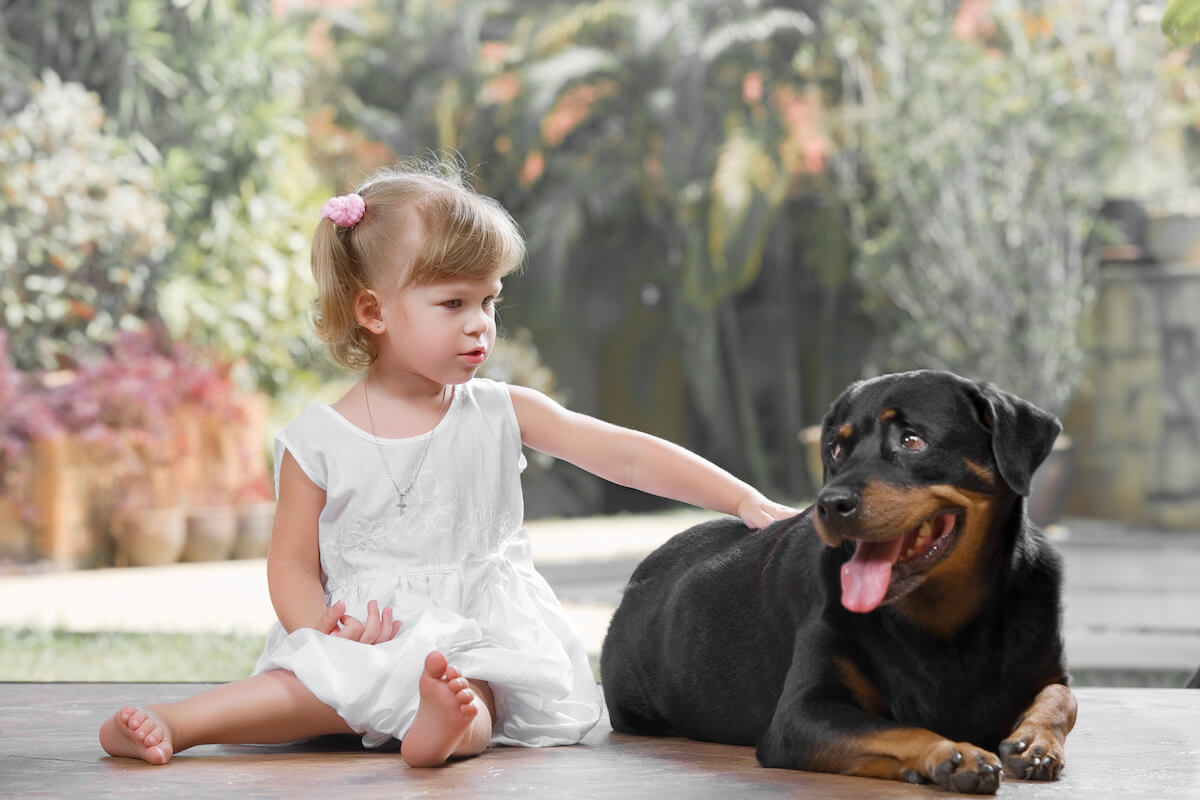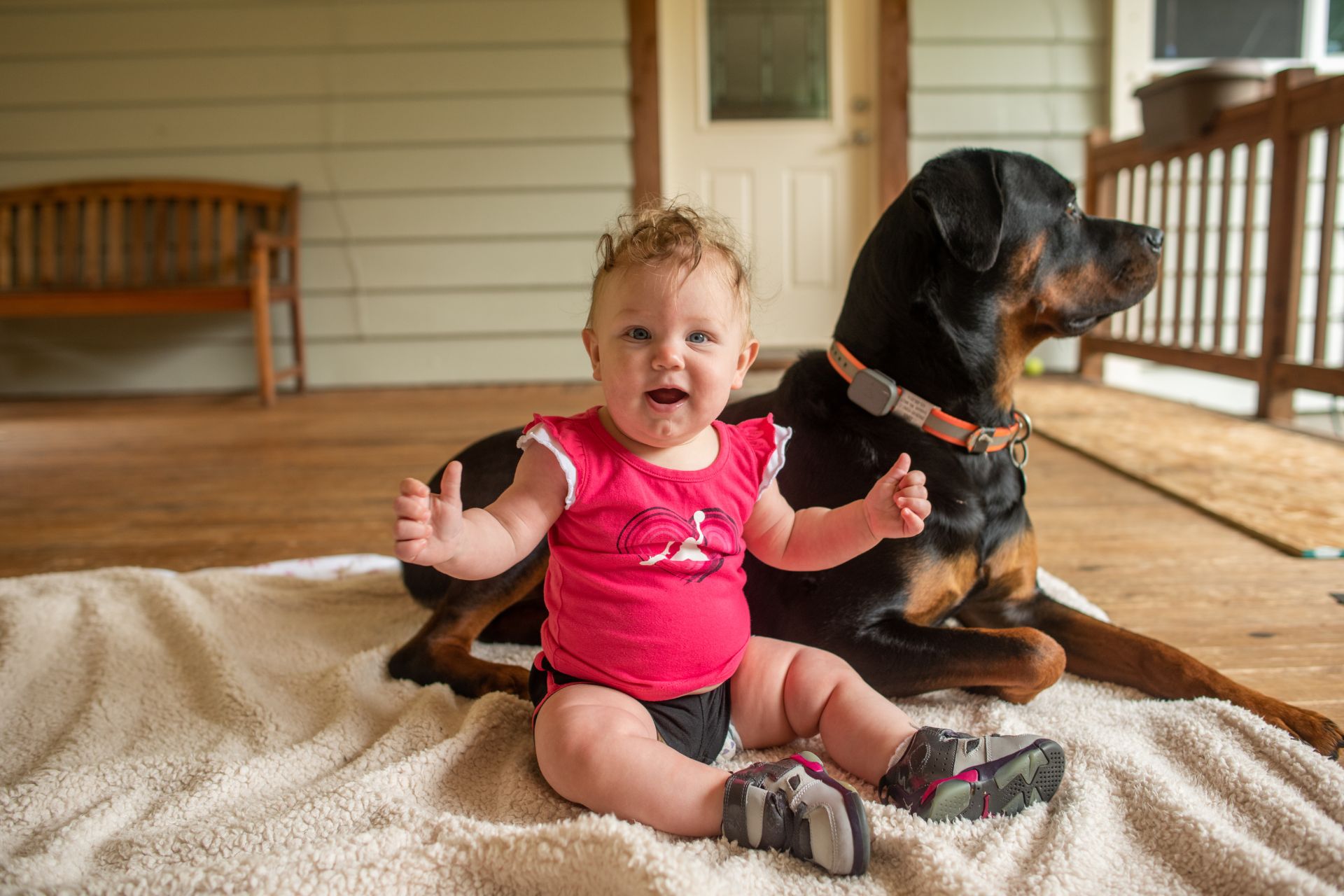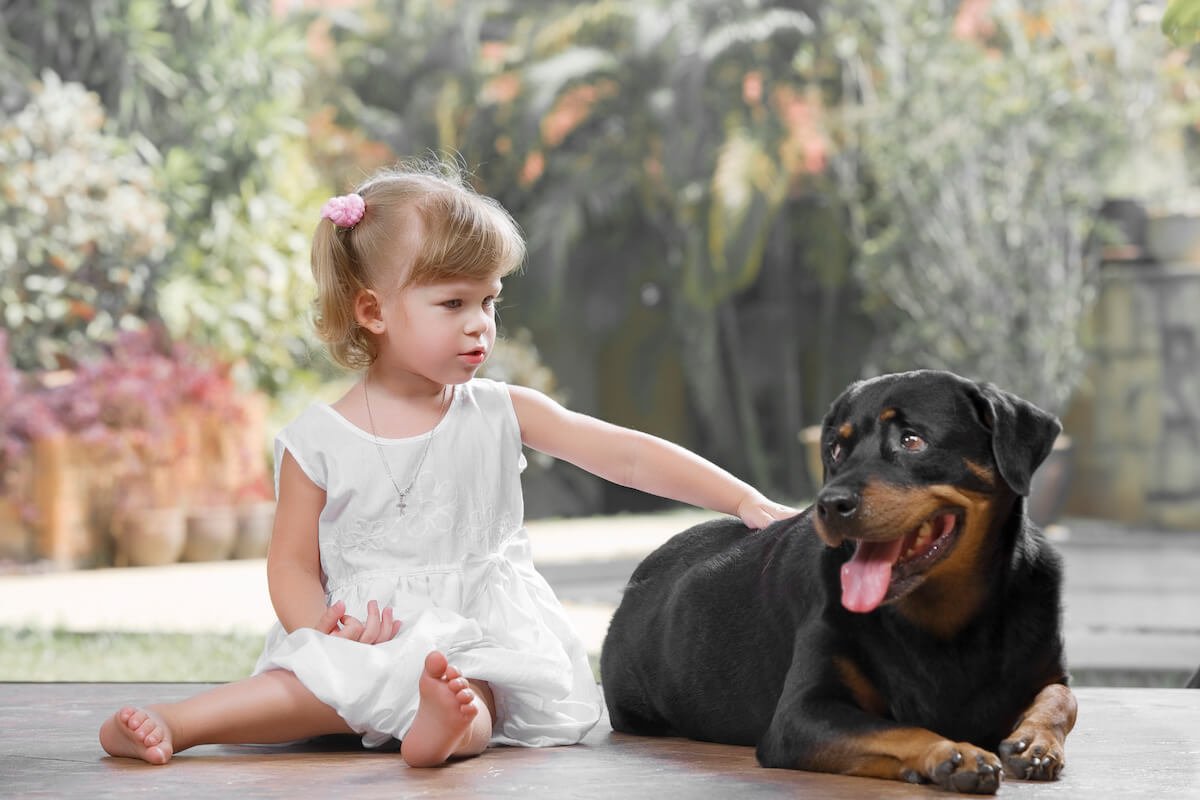Are you curious about how rottweilers interact with babies? Well, let’s dive right into it and explore this fascinating topic! Rottweilers, known for their loyal and protective nature, can be great companions for families with little ones. However, it’s important to understand how these strong and powerful dogs behave around babies to ensure a safe and harmonious environment.
First things first, rottweilers have a reputation for being loving and gentle with babies. With proper socialization and training, they can form strong bonds with your little bundle of joy. Rottweilers are known to be patient and tolerant, making them well-suited for family life. But like any dog, it’s crucial to supervise their interactions and teach both the dog and the baby how to respect each other’s boundaries.
While rottweilers are generally good with babies, it’s essential to consider individual temperament and personality traits. Some rottweilers may be more laid-back and relaxed, while others may have a more energetic and boisterous nature. It’s crucial to assess the dog’s behavior and establish clear guidelines to ensure a safe and positive relationship between the rottweiler and your little one.

How Are Rottweilers with Babies?
Rottweilers are known for their strength, loyalty, and protective nature. However, when it comes to babies, many people are cautious about introducing these powerful dogs into a household with young children. In this article, we will explore how Rottweilers interact with babies, their temperament, and important considerations for parents who own or are considering owning a Rottweiler.
Rottweilers and Babies: What You Need to Know
Before diving into the details, it’s important to understand the nature of Rottweilers and the traits that make them unique. Rottweilers are large and powerful dogs that have a strong instinct to protect their family. They are also highly intelligent and can be easily trained. However, as with any breed, individual Rottweiler temperament can vary depending on factors such as early socialization, training, and the owner’s ability to provide consistent discipline and guidance.
The Protective Nature of Rottweilers
Rottweilers have a strong protective instinct, which can be both a positive and a potential concern when it comes to babies. On one hand, their protective nature means that they may naturally be inclined to look out for the well-being of a baby, acting as a guardian and protector. This can provide a sense of security to parents, knowing that their Rottweiler is watching over their child.
However, it’s important to note that the protective instinct can also manifest itself in behaviors that may be perceived as aggressive or territorial. Without proper socialization and training, a Rottweiler may exhibit protective behaviors that can be intimidating or potentially harmful to a baby or young child. Therefore, it is crucial for owners to establish clear boundaries and train their Rottweilers to respond appropriately in various situations.
To ensure a safe and positive relationship between a Rottweiler and a baby, early socialization and training are of utmost importance. Exposing the Rottweiler to different people, environments, and situations from an early age can help them develop a well-rounded temperament and reduce the likelihood of any protective instincts turning into aggression towards the baby.
Supervision and Boundaries
When it comes to Rottweilers and babies, constant supervision is key. While Rottweilers have the potential to be loving and gentle with babies, their size and strength mean that accidents can happen if they are not carefully monitored. It is important for parents to never leave a Rottweiler alone with a baby, as even the gentlest dog can unintentionally harm an infant during play or interaction.
Setting boundaries is equally crucial. Teaching a Rottweiler to respect the baby’s personal space and establishing rules around appropriate behavior is vital for a harmonious coexistence. This can be achieved through positive reinforcement training techniques, such as rewarding the dog for calm and gentle behavior around the baby, and redirecting any unwanted behaviors with clear commands and redirection to appropriate outlets for their energy.
Additionally, parents should ensure that the baby’s environment is safe and secure. Adding baby gates or creating designated areas where the baby can play and explore freely, away from the dog, can help prevent any accidental incidents and allow for a more comfortable coexistence.
Training and Socialization
“Just like with any other breed, proper training and socialization from an early age are crucial for a successful relationship between a Rottweiler and a baby.”
Training a Rottweiler to behave appropriately around a baby requires consistency, patience, and positive reinforcement. Start by teaching basic commands such as “sit,” “stay,” and “leave it,” which can help establish clear boundaries and reinforce the owner’s control over the dog’s behavior.
Enrolling in a reputable puppy training class or seeking the guidance of a professional dog trainer can be beneficial, especially for first-time Rottweiler owners. These classes provide an opportunity for socialization with other dogs and people, which can help shape the Rottweiler’s behavior and ensure they are comfortable and well-adjusted in various environments.
Remember, a well-trained and socialized Rottweiler is more likely to interact positively with a baby, making the experience safer and more enjoyable for everyone involved.
General Tips for Rottweiler Owners with Babies
- Establish a routine that includes exercise, training, and playtime for your Rottweiler to help them release energy and remain calm around the baby.
- Provide your Rottweiler with a designated space or crate where they can retreat when they need some alone time or when the baby’s activities become overwhelming.
- Gradually introduce your Rottweiler to the baby, starting with supervised interactions and gradually increasing the duration and intensity.
- Never force your Rottweiler to interact with the baby if they show signs of discomfort or anxiety. Allow them to approach the baby at their own pace.
- Monitor and manage any signs of possessiveness or guarding behavior from your Rottweiler, as this can potentially escalate and pose a risk to the baby.
- Always reward positive and gentle interactions between your Rottweiler and the baby, reinforcing their good behavior.
Rottweilers and Babies: A Loving Relationship is Possible
When approached with caution, proper training, and socialization, Rottweilers can develop a loving and protective bond with babies. It’s essential for owners to take proactive steps to ensure a safe and harmonious relationship between their Rottweiler and their baby. By providing consistent boundaries, supervision, and positive reinforcement, a Rottweiler can become a loyal and gentle companion for a growing family.
Key Takeaways: How Are Rottweilers with Babies?
- Rottweilers can be great companions and protectors for babies.
- Introduce babies to Rottweilers gradually and in a controlled environment.
- Supervision is crucial to ensure safety and prevent accidents.
- Early socialization and training can help Rottweilers develop positive behaviors around babies.
- Every dog is an individual, so it’s important to assess the temperament of each Rottweiler around babies.
Frequently Asked Questions
Rottweilers are known for their protective nature and loyalty. Many families wonder how these dogs interact with babies, as their behavior can greatly impact the safety and well-being of both the child and the dog. In this section, we’ll address common concerns about the relationship between Rottweilers and babies.
1. How do Rottweilers generally behave around babies?
Rottweilers can be very gentle and patient with babies when properly trained and socialized. These dogs are often naturally protective, and when they are raised in a loving and positive environment, they can form strong bonds with children. However, it’s important to note that each dog is unique, and individual temperament can vary.
Introducing a Rottweiler to a baby should be done with caution, and it is always recommended to closely supervise their interactions. Early socialization and positive reinforcement training play a crucial role in ensuring that a Rottweiler understands how to behave around babies and learns to be gentle and calm in their presence.
2. Are Rottweilers safe to have around small children?
When properly trained and supervised, Rottweilers can be safe around small children. It’s essential to establish boundaries for both the child and the dog to prevent any potential accidents or misunderstandings. Never leave a baby or young child alone with any dog, including a Rottweiler.
Training your Rottweiler to obey basic commands such as “sit,” “stay,” and “leave it” can help ensure a safer environment for your child. Teaching your child about respectful behavior towards animals is also important, such as not pulling on the dog’s tail or ears and not bothering them while eating or sleeping. With proper guidance and supervision, the relationship between a Rottweiler and a small child can be a loving and rewarding one.
3. Can Rottweilers become jealous of babies?
Jealousy is a complex emotion that can vary from dog to dog. While Rottweilers can form strong bonds with their families, proper training and socialization can help prevent and manage feelings of jealousy. It’s crucial to establish a routine that includes attention, exercise, and social interaction with the dog, even after the arrival of a baby.
Introducing positive associations, like treats or playtime, when the baby is present can help your Rottweiler associate the baby with positive experiences. Gradual and supervised introductions, coupled with consistent training and reinforcement of desired behaviors, can minimize the likelihood of jealousy or possessiveness.
4. How do Rottweilers react to baby cries?
Rottweilers, like many dogs, can be sensitive to loud noises, including cries from babies. It’s essential to expose your Rottweiler to various sounds, including baby cries, during their socialization period. By gradually increasing exposure and providing positive reinforcement, you can help your dog become accustomed to these sounds and learn not to react negatively.
If your Rottweiler shows signs of discomfort or agitation around loud noises, including baby cries, consult a professional dog trainer or behaviorist for guidance. They can provide tailored advice to help your Rottweiler feel more comfortable and confident in such situations.
5. How can I ensure a safe and positive interaction between my Rottweiler and my baby?
To ensure a safe and positive interaction between your Rottweiler and your baby, here are some important steps to follow:
- Provide early socialization for your Rottweiler with people of all ages, including babies.
- Enroll your Rottweiler in obedience training classes to establish good manners and ensure they respond well to commands.
- Supervise all interactions between your Rottweiler and your baby, even when the dog has shown positive behavior in the past.
- Teach your baby how to properly interact with dogs, such as not pulling their fur or bothering them while they eat or sleep.
- Continue to give your Rottweiler attention, exercise, and social interaction to prevent feelings of neglect or jealousy.
By following these guidelines and consistently reinforcing positive behavior, you can help foster a safe and harmonious relationship between your Rottweiler and your baby.

Loyal Rottweiler Copies Everything Her Baby Sister Does | The Dodo Soulmates
Summary
So, how are Rottweilers with babies? Rottweilers can be great with babies if they are raised in a loving and well-trained environment. It’s important to socialize them early on and supervise their interactions.
With the right training, Rottweilers can be gentle and protective of babies, but it’s crucial to always prioritize safety and never leave them alone together. Remember, every dog is different, so it’s essential to assess your individual Rottweiler’s temperament and behavior.
Ultimately, creating a positive and safe environment for both your Rottweiler and your baby is possible with patience, consistency, and responsible ownership.
